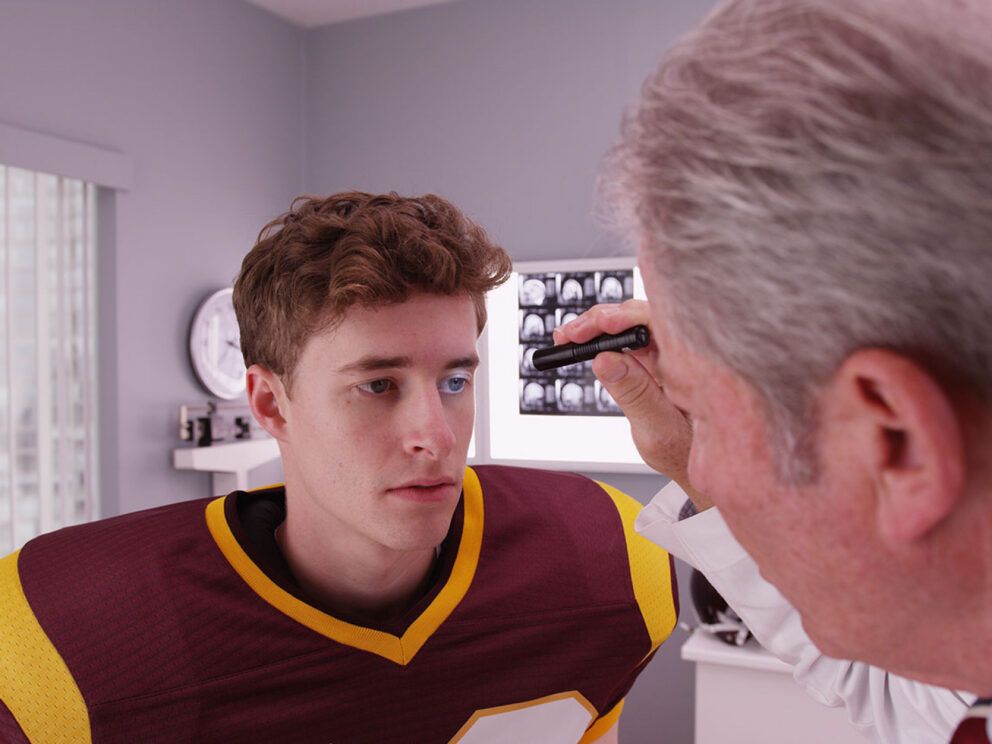Please visit an Emergency Room if you are experiencing any of the below symptoms following head trauma as this may indicate a more serious condition:
• Unequal pupil size
• Double vision
• Significant drowsiness or inability to wake up
• Severe or worsening headache
• Significant neck pain or tenderness
• Slurred speech, weakness, numbness, or decreased coordination
• Repeated vomiting
• Weakness or tingling/burning in both arms or legs
• Convulsions or seizures
• Unusual behavior, increased confusion, restlessness, or agitation
• Visible deformity of the skull
• Loss of consciousness
A concussion is a form of mild traumatic brain injury that can cause many different symptoms, resulting in functional impairment. Sport-related concussions are fairly common in athletes. Diagnosis of concussions has improved in recent years due to both increased recognition and reporting, as well as a continually increasing number of adolescent athletes participating in sports. This is especially important as unreported concussions can increase the risk of serious long term neurological consequences.
What Causes Concussions?
Concussions are typically caused by direct blows to the head, with or without a loss of consciousness, or via a whiplash mechanism. Sports that see the most concussions include tackle football, men’s ice hockey and women’s soccer.
What Are the Symptoms of a Concussion?
There are a wide range of symptoms that can interfere with a patient’s day-to-day life and may include:
• Headache
• Neck pain
• Nausea or vomiting
• Balance problems
• Dizziness
• Blurred vision
• Sensitivity to light or noise
• Brain fog
• Difficulty with concentration and/or memory
• Fatigue
• Increased emotionality, anxiety, irritability, and/or sadness
• Impaired sleep
How Do We Diagnose a Concussion?
We diagnose concussions by taking a thorough history and performing various physical exam maneuvers, including neurological testing. We understand and recognize the many ways that concussion symptoms may manifest themselves. These symptoms may be related to cognition, balance, coordination and/or vision – and are all unique to the individual.
How Do We Treat Concussions?
While the vast majority of patients will recover without issue within a couple of weeks, some patients may experience prolonged symptoms and require additional medical treatment.
In the case of adolescent athletes, our goal is to ensure a swift and smooth return to school and subsequently sport. As concussions may cause issues with concentration, focus, and memory, some student-athletes may require specific academic adjustments to aid with the transition back to school. Our providers help oversee a safe return to sport by communicating with athletic trainers and coaches.
We may also refer patients to other types of providers who specialize in the treatment of headaches, cognitive dysfunction, sleep disorders, mental health issues, and vision problems, if necessary.
Learn more about concussion dos and don’ts here.
Concussions are typically caused by direct blows to the head, with or without a loss of consciousness, or via a whiplash mechanism. Sports that see the most concussions include tackle football, men’s ice hockey and women’s soccer.
There are a wide range of symptoms that can interfere with a patient’s day-to-day life and may include:
• Headache
• Neck pain
• Nausea or vomiting
• Balance problems
• Dizziness
• Blurred vision
• Sensitivity to light or noise
• Brain fog
• Difficulty with concentration and/or memory
• Fatigue
• Increased emotionality, anxiety, irritability, and/or sadness
• Impaired sleep
We diagnose concussions by taking a thorough history and performing various physical exam maneuvers, including neurological testing. We understand and recognize the many ways that concussion symptoms may manifest themselves. These symptoms may be related to cognition, balance, coordination and/or vision – and are all unique to the individual.
While the vast majority of patients will recover without issue within a couple of weeks, some patients may experience prolonged symptoms and require additional medical treatment.
In the case of adolescent athletes, our goal is to ensure a swift and smooth return to school and subsequently sport. As concussions may cause issues with concentration, focus, and memory, some student-athletes may require specific academic adjustments to aid with the transition back to school. Our providers help oversee a safe return to sport by communicating with athletic trainers and coaches.
We may also refer patients to other types of providers who specialize in the treatment of headaches, cognitive dysfunction, sleep disorders, mental health issues, and vision problems, if necessary.
Learn more about concussion dos and don’ts here.
Why Choose Orthopedic Associates of Dutchess County for Concussion Treatment
Orthopedic Associates of Dutchess County is a resource for coaches, trainers and patients who are concerned that an athlete may have suffered a concussion. Patients who have suspected concussions will receive a thorough evaluation in order for us to create a tailored treatment plan. Our team includes primary care sports medicine physicians to provide you with the full spectrum of care.
Physicians

- Primary Care Sports Medicine
- Sports Medicine
Practicing in:
Poughkeepsie and Hopewell Junction


